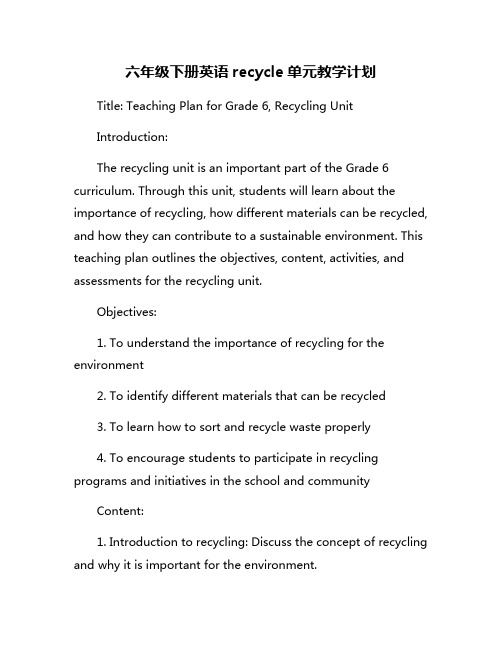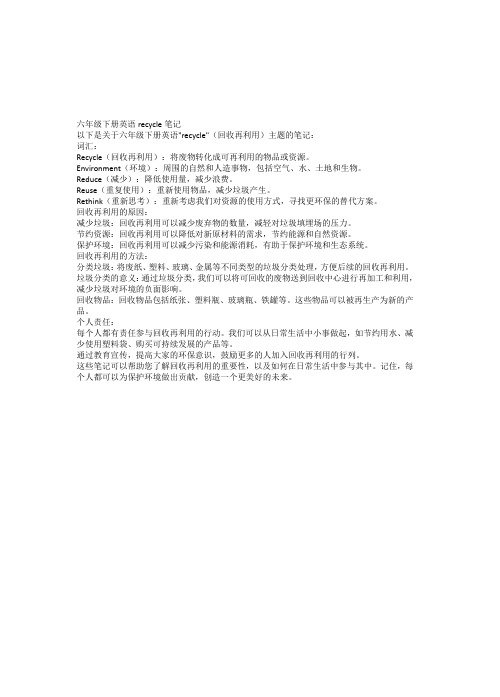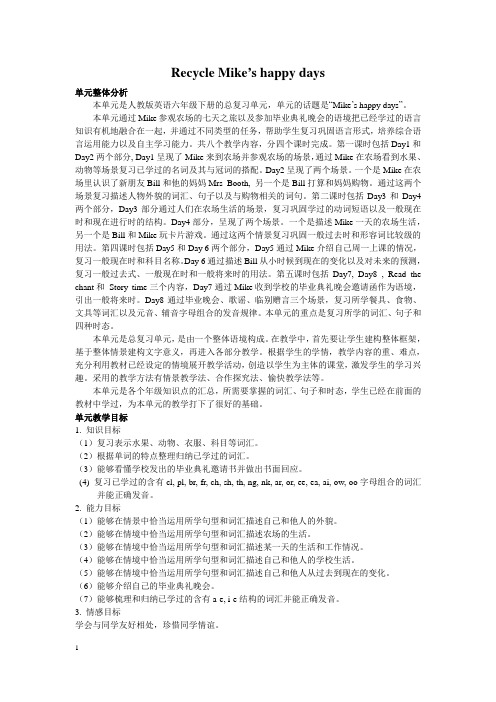六年级英语下册Recycle
六年级下册英语recycle单元教学计划

六年级下册英语recycle单元教学计划Title: Teaching Plan for Grade 6, Recycling UnitIntroduction:The recycling unit is an important part of the Grade 6 curriculum. Through this unit, students will learn about the importance of recycling, how different materials can be recycled, and how they can contribute to a sustainable environment. This teaching plan outlines the objectives, content, activities, and assessments for the recycling unit.Objectives:1. To understand the importance of recycling for the environment2. To identify different materials that can be recycled3. To learn how to sort and recycle waste properly4. To encourage students to participate in recycling programs and initiatives in the school and communityContent:1. Introduction to recycling: Discuss the concept of recycling and why it is important for the environment.2. Types of recyclable materials: Introduce different materials that can be recycled such as paper, plastic, glass, and metal.3. Sorting waste: Teach students how to sort waste into recyclable and non-recyclable categories.4. Recycling process: Explain the process of recycling different materials and how they can be reused.5. Recycling initiatives: Discuss recycling programs and initiatives in the school and community.Activities:1. Classroom discussion: Engage students in discussions about the importance of recycling and their role in protecting the environment.2. Sorting game: Conduct a waste sorting game where students have to correctly sort different items into recyclable and non-recyclable categories.3. Recycling project: Assign students a recycling project where they have to create something useful from recycled materials.4. Field trip: Organize a field trip to a recycling center or waste management facility to show students the recycling process firsthand.5. Recycling drive: Plan a recycling drive in the school or community where students collect recyclable materials and donate them to a recycling center.Assessments:1. Quizzes: Administer quizzes to assess students' understanding of recycling concepts and materials.2. Projects: Evaluate students' recycling projects based on creativity, effort, and use of recycled materials.3. Participation: Assess students' participation in classroom discussions, activities, and recycling initiatives.4. Reflections: Ask students to write reflections on their learning and the impact of recycling on the environment.Conclusion:The recycling unit is an important part of the Grade 6 curriculum as it teaches students about the importance of recycling and how they can contribute to a sustainable environment. By following this teaching plan, educators caneffectively engage students in learning about recycling and empower them to become responsible global citizens.。
六年级下册英语recycle课堂笔记

六年级下册英语复习课堂笔记以下是一份六年级下册英语Recycle课堂笔记:标题:Recycle 1——复习单元1一、重点词汇:1.动词:swim,skate,play,jump,draw,write,dive,fly2.名词:day,night,dog,cat,tiger,elephant,bird,insect3.形容词:big,small,fat,thin,strong,thin,tall,short4.介词:in,on,under,behind,above,below二、重点词组:1.do morning exercises(做早操)2.eat breakfast(吃早饭)3.have English class(上英语课)4.play sports(进行体育运动)5.eat dinner(吃晚饭)6.go to bed(睡觉)7.get up(起床)8.go to school(去上学)e home(回家)10.do homework(做家庭作业)11.watch TV(看电视)12.read books(读书)13.play computer games(玩电脑游戏)14.go to the park(去公园)15.go shopping(购物)16.go swimming(游泳)17.go skating(滑冰)18.fly kites(放风筝)19.draw pictures(画画)20.write stories(写故事)三、重点语法:1.现在进行时态:表示正在进行的动作或存在的状态。
结构为“be动词+动词ing”。
例如:I am drawing a picture now.(我现在正在画画。
)2.动词过去式:表示过去发生的动作。
结构为“动词+ed”。
例如:Wewent to the zoo yesterday.(我们昨天去了动物园。
)3.疑问句和回答句:询问信息和答案的问答方式。
人教版六年级下册英语Recycle教材部分课文翻译

人教版六年级下册英语Recycle教材部分课文翻译人教版六年级下册英语Recycle教材部分课文翻译1Day 1 A beautiful farm部分翻译Mike visited a farm. What can you see on the farm?迈克参观了一个农场。
你在农场里能看见什么?a pear 一个梨____jacket ____夹克衫____egg ____鸡蛋____orange ____橙子____umbrella ____雨伞____apples ____苹果____horses ____马____tomatoes ____西红柿a 一(个,件……)an一(个,件……)some 一些What else can you see?你还能看见什么?Can you name the groups of words?你能给单词小组命名吗?Fruit 水果apple 苹果orange 橙子egg 鸡蛋cake 蛋糕jacket 夹克衫shoes 鞋horse 马tomato 西红柿Can you think of one more word group? Can you add more words to the groups?你能再想出一个单词小组吗?你能给这些小组增加更多的单词吗?2Day 2 Farmers' market部分翻译Mrs Booth and Bell want to go shopping, Help them finish their mind map.布思夫人和比尔想要去购物帮助他们完成他们的思维图。
morning 早晨Farmers' market 农民们的市场When? 什么时候?With who? 和谁?Where? 在哪里?shopping 购物shopping list 购物清单How can we get there? 我们怎样能到达那里?How much? 多少钱?Now make a new word map with your partner.现在和你的同伴制作一个新的词汇地图。
六年级下册英语——recycle(笔记)

六年级下册英语recycle笔记
以下是关于六年级下册英语"recycle"(回收再利用)主题的笔记:
词汇:
Recycle(回收再利用):将废物转化成可再利用的物品或资源。
Environment(环境):周围的自然和人造事物,包括空气、水、土地和生物。
Reduce(减少):降低使用量,减少浪费。
Reuse(重复使用):重新使用物品,减少垃圾产生。
Rethink(重新思考):重新考虑我们对资源的使用方式,寻找更环保的替代方案。
回收再利用的原因:
减少垃圾:回收再利用可以减少废弃物的数量,减轻对垃圾填埋场的压力。
节约资源:回收再利用可以降低对新原材料的需求,节约能源和自然资源。
保护环境:回收再利用可以减少污染和能源消耗,有助于保护环境和生态系统。
回收再利用的方法:
分类垃圾:将废纸、塑料、玻璃、金属等不同类型的垃圾分类处理,方便后续的回收再利用。
垃圾分类的意义:通过垃圾分类,我们可以将可回收的废物送到回收中心进行再加工和利用,减少垃圾对环境的负面影响。
回收物品:回收物品包括纸张、塑料瓶、玻璃瓶、铁罐等。
这些物品可以被再生产为新的产品。
个人责任:
每个人都有责任参与回收再利用的行动。
我们可以从日常生活中小事做起,如节约用水、减少使用塑料袋、购买可持续发展的产品等。
通过教育宣传,提高大家的环保意识,鼓励更多的人加入回收再利用的行列。
这些笔记可以帮助您了解回收再利用的重要性,以及如何在日常生活中参与其中。
记住,每个人都可以为保护环境做出贡献,创造一个更美好的未来。
六年级下册英语书第42页

六年级下册英语书第42页是“Recycle ”,内容如下:Recycle Day 7 Mike’s surprise- Listen and tick.Mike: Hi, Zhang Peng.Did you hear about the party?迈克:嗨,张鹏。
你听说聚会了吗?Zhang Peng: No, I didn't.What party?张鹏:不,我没有。
什么聚会?Mike: It's a farewell party.There are going to be games and prizes.迈克:它是一个告别聚会。
将会有游戏和奖品。
Zhang Peng: Where is it?张鹏:它在哪里(举行)?Mike: In the music room on the second floor, near the teachers' office.迈克:在二楼的音乐室,在教师办公室附近。
Zhang Peng: Is Wu Binbin going?张鹏:吴彬彬会去吗?Mike: Yes.Robin is going, too.迈克:是的。
罗宾也会去。
Zhang Peng: What about John?张鹏:约翰呢?Mike: He's ill.He isn't going.He should rest and get some sleep.迈克:他生病了。
他不会去。
他应该休息并且睡觉。
Zhang Peng: That's a pity.What time is the party?张鹏:那很遗憾。
聚会是什么时间?Mike: At 3 p.m. on Friday.It will be great!迈克:在星期五下午三点。
它将会很棒!Zhang Peng: OK.See you there.张鹏:好的。
在那里见。
Recycle Day 8 A farewell party-Read the chant. The party is on Friday.聚会在星期五。
人教版六年级英语下册(三起点)recycle教案含作业设计

Recycle Mike’s happy days单元整体分析本单元是人教版英语六年级下册的总复习单元,单元的话题是“Mike’s happy days”。
本单元通过Mike参观农场的七天之旅以及参加毕业典礼晚会的语境把已经学过的语言知识有机地融合在一起,并通过不同类型的任务,帮助学生复习巩固语言形式,培养综合语言运用能力以及自主学习能力。
共八个教学内容,分四个课时完成。
第一课时包括Day1和Day2两个部分, Day1呈现了Mike来到农场并参观农场的场景,通过Mike在农场看到水果、动物等场景复习已学过的名词及其与冠词的搭配。
Day2呈现了两个场景。
一个是Mike在农场里认识了新朋友Bill和他的妈妈Mrs Booth, 另一个是Bill打算和妈妈购物。
通过这两个场景复习描述人物外貌的词汇、句子以及与购物相关的词句。
第二课时包括Day3和Day4两个部分,Day3部分通过人们在农场生活的场景,复习巩固学过的动词短语以及一般现在时和现在进行时的结构。
Day4部分,呈现了两个场景。
一个是描述Mike一天的农场生活,另一个是Bill和Mike玩卡片游戏。
通过这两个情景复习巩固一般过去时和形容词比较级的用法。
第四课时包括Day5和Day 6两个部分,Day5通过Mike介绍自己周一上课的情况,复习一般现在时和科目名称。
Day 6通过描述Bill从小时候到现在的变化以及对未来的预测,复习一般过去式、一般现在时和一般将来时的用法。
第五课时包括Day7, Day8 , Read the chant和Story time三个内容,Day7通过Mike收到学校的毕业典礼晚会邀请函作为语境,引出一般将来时。
Day8通过毕业晚会、歌谣、临别赠言三个场景,复习所学餐具、食物、文具等词汇以及元音、辅音字母组合的发音规律。
本单元的重点是复习所学的词汇、句子和四种时态。
本单元是总复习单元,是由一个整体语境构成。
在教学中,首先要让学生建构整体框架,基于整体情景建构文字意义,再进入各部分教学。
Recycle(教案)人教PEP版英语六年级下册
Lesson plan: RecycleTarget grade: 6th gradeTextbook: People’s Education Press (PEP) version of English 6BObjectives:1.Understand the importance of recycling for the environment2.Learn new vocabulary related to recycling3.Develop listening and speaking skills through interactive activities4.Engage in a group project to promote recycling in the communityMaterials:•Whiteboard and markers•Flashcards with recycling-related vocabulary•Listening exercise audio clips•Posters, cardboard boxes, and other supplies for the group project Procedures:1.Introduction (5 minutes)•Greet students and introduce the topic of recycling•Ask students what they already know about recycling and write their responses on the whiteboard2.Vocabulary (15 minutes)•Use flashcards to introduce recycling-related vocabulary such as recycle, reuse, reduce, compost, landfill, and pollution•Go over the meanings and pronunciation of each word with the students•Create example sentences using the new vocabulary and have students practice saying them3.Listening (15 minutes)•Play audio clips related to recycling and have students listen attentively•Provide a worksheet with multiple-choice questions for students to answer after the listening exercise•Review the correct answers with the class4.Interactive activities (20 minutes)•Divide the class into small groups and assign each group a different recycling-related task such as creating posters, designing recycling bins, or writing a recycling-themed song•Provide the necessary supplies and give students time to work on their projects•Circulate around the room to provide guidance and answer questions5.Presentation (15 minutes)•Have each group present their project to the class•Encourage students to discuss the importance of recycling and how their project can contribute to the community’s recycling efforts •Allow time for questions and comments from other groups6.Conclusion (5 minutes)•Recap the new vocabulary learned and the activities done during the lesson•Encourage students to continue promoting recycling in their daily livesAssessment:•Observe students’ participation and group work during theactivity•Evaluate students’ understanding of the listening exercise through the worksheet•Assess students’ oral proficiency through their presentation and class discussion of their group projectHomework:•Write a short paragraph about the importance of recycling and how it can benefit the environment and our community.。
人教PEP版英语六年级下册《Recycle 第三课时》教学课件
本课件是在Micorsoft PowerPoint的平台上制作的,可以在Windows环境下独立运 行,集文字、符号、图形、图像、动画、声音于一体,交互性强,信息量大,能多路 刺激学生的视觉、听觉等器官,使课堂教育更加直观、形象、生动,提高了学生学习 的主动性与积极性,减轻了学习负担,有力地促进了课堂教育的灵活与高效。
伴你成长 A. play football B. sing songs
books
C. read Chinese
( C )3. _________ favourite day is Tuesday.
A. She
B. He’s
C. His
三、按要求完成各题。
1. I often answer maths questions in maths class.(用she改写。) __S_h_e__ often _an_s_w_e_r_s maths questions in maths class. 2. Bob likes candy.(用一般过去时改写。)
in the gym. He likes basketball best.
Day 6 Mike and his new friends: Part 2
Mike’s school life was wonderful. Bill made a poster to introduce himself to Mike. This is Bill’s poster.
Lead in Do you like your school life? Look at the questions. Talk about in pairs.
What’s your favorite day at school? What classes do you have on that day? What’s your favourite subject? Why?
人教PEP版英语六年级下册《Recycle 2》word教案
人教PEP版英语六年级下册《Recycle 2》word教案一. 教材分析《Recycle 2》是人教PEP版英语六年级下册的一篇课文,主题为“动物”,通过描述动物的特点和习性,让学生在掌握英语知识的同时,增加对动物世界的了解。
本课主要让学生运用所学知识进行对话交流,提高他们的语言运用能力。
二. 学情分析六年级的学生已经掌握了基本的英语语法和词汇,具备一定的听说读写能力。
他们对动物世界充满好奇,容易产生兴趣。
但在口语表达方面,部分学生可能还存在一定的困难,需要通过教师的引导和激励,提高他们的自信心和积极性。
三. 教学目标1.知识目标:学生能够听懂、会说、会读本课的生词和句子,了解动物的特点和习性。
2.能力目标:学生能够在日常生活中运用所学知识进行简单的对话交流。
3.情感目标:培养学生关爱动物、保护环境的意识。
四. 教学重难点1.重点:学生能够熟练掌握本课的生词和句子,正确运用所学知识进行对话。
2.难点:学生能够在实际情境中灵活运用所学知识,提高口语表达能力。
五. 教学方法1.情境教学法:通过设置各种情境,让学生在实际语境中学习、运用英语。
2.互动教学法:引导学生积极参与课堂活动,提高他们的口语表达能力。
3.游戏教学法:运用游戏激发学生的学习兴趣,巩固所学知识。
六. 教学准备1.教材:《人教PEP版英语六年级下册》2.课件:动物图片、视频等3.学具:动物卡片、单词卡片等4.教学场地:教室七. 教学过程1.导入(5分钟)教师展示各种动物的图片,引导学生说出动物的名称,复习已学的动物词汇。
2.呈现(5分钟)教师播放课文动画视频,让学生初步感知课文内容。
观看结束后,教师提问学生关于动物的特点和习性,引导学生回答。
3.操练(10分钟)教师将学生分成小组,每组选一个动物,用英语描述该动物的特点和习性。
其他小组听后,猜猜是哪种动物。
通过这个活动,让学生熟练掌握本课的生词和句子。
4.巩固(5分钟)教师设计一个动物运动会游戏,让学生在游戏中运用所学知识。
人教PEP版英语六年级下册RECYCLE1(5)课件
I went on a trip. What did you do ? I went to Beijing. I went to the Great Wall.
I went on a trip. What did you see? I saw the sky. I saw the mountains.
第七册
go to the cinema / the hospital…
相
When are you going ?
关
this evening / next week…
链 接
How are you going ?
by plane / by train / by car…
第八册
பைடு நூலகம்
What did you do ? I’m taller than you .
Mike
Dear _________,
This post card shows you a picture from my ______. We went to _______. We saw ___and ______. There were many people there. Tomorrow we are going to _____.There are no _____there. Do you think I will see there?
take a trip read a magazine go to the cinema buy post card buy newspaper buy comic book buy dictionary
go to the cinema go to the hospital go to the post office go to the book store go to the pet shop go to the shoe shop go to the science museum
- 1、下载文档前请自行甄别文档内容的完整性,平台不提供额外的编辑、内容补充、找答案等附加服务。
- 2、"仅部分预览"的文档,不可在线预览部分如存在完整性等问题,可反馈申请退款(可完整预览的文档不适用该条件!)。
- 3、如文档侵犯您的权益,请联系客服反馈,我们会尽快为您处理(人工客服工作时间:9:00-18:30)。
一、用所给单词的正确形式填空。 1.He ___is___(be) a doctor. 2.Mary _w_a_n_t__(want) to visit her grandma next
weekensd. 3.They _t_a_ke___(take) a walk after dinner every day. 二、按要求改写下列句子。 1.The dog feels sad.(改为一般疑问句)
回到首页
Can you name the group of the words?
Fruit
apple orange
pear banana watermelon
Food
egg cake rice noodles hamburger
Clothes Animal Vegetable Colour
jacket shoes
2.构成: (1)主语+be动词+其他. 例如:
Lily is tall.莉莉很高。 His mother is happy.他的妈妈很高兴。 (2)第三人称单数主语+动词第三人称单数 形式+其他.例如: Andy usually plays football on Sunday.安 迪通常星期天踢足球。 (3)其他人称主语+动词原形+其他.例如: We water TV after dinner.我们晚饭后看 电视。
go
do
He goes fishing.
She does the cleaning.
He goes swimming.
She does her homework.
He goes boating.
She does the dishes.
回到首页
play
He plays music. He plays ping-pong.
回到首页
Day 2 Farmers’ market
Mike met new friends. Help him talk about them.
回到首页
Day 3 Life on the farm
These are things people often do on the farm. Circle the words in the puzzle. Write down what he, she or they do every day.
He plays basketball.
have
They have some juice.
They have fresh vegetables.
They have art class.
回到首页
一般现在时
1.用法:一般现在时表示经常性或习惯性 的动作、现在的特征或状态。例如: I get up at six every day.我每天六点起床。 He is nine years old.他九岁。
coat pants socks
horse
cow hen goat sheep
tomato
carrot onion potato green beans
red blue green brown yellow
Can you think of one more word group? Can you add more words to the groups?
回到首页
3.句型变化: A.否定句: (1)主语+be动词+not+其他. 例如: She is not a student.她不是学生。 (2)第三人称单数主语+doesn't+动词原形 +其他.例如: Tom doesn't like dogs.汤姆不喜欢狗。 (3)其他人称主语+don't+动词原形+其他.例如: They don't have maths today.他们今天没有 数学课。 B.疑问句: (1)Be动词+主语+其他? 例如: Are you from China?你来自中国吗? (2)Does+第三人称单数主语+动词原形+其他? 例如: Does he go home on foot?他步行回家吗? (3)Do+其他人称主语+动词原形+其他?例如: Do they live here?他们住在这儿吗?
2. 以s,x,sh,ch结尾的可数名词,一般在词尾加-es。
如bus—buses
一起来回顾
3. 以“辅音字母+y”结尾的可数名词,改y为i再 一下吧
加-es。如city—cities
4. 以f或fe结尾的Leabharlann 数名词,变f/fe为v再加-es。
如knife—knives
5. 以o结尾的可数名词,一般在词尾加-s,但
potato(加-es),tomato(加-es)除外。如photo—
photos,bamboo—bamboos.
回到首页
将下列中文翻译成英文。 一只猴子__a__m_o__n_ke_y________ 一些盒子__s_o_m__e_b_o_x_e_s______ 五个土豆__fi_v_e_p_o_t_a_t_o_e_s_____ 一头大象___a_n_e_l_e_p_h_a_n_t_____ 三块手表____th_r_e_e__________ 一只耳朵____wa_an_t_ceh_ae_r s________ 两场聚会____t_w_o__p_a_rt_i_e_s____ 一些男孩_____so__m_e__b_o_y_s____ 九个动物园____n_in_e__z_o_o_s______
Day 1 Day 3 Day 5 Day 7
Day 2 Day 4 Day 6 Day 8
2020/5/16
Day 1 A beautiful farm
Mike visited a farm. What can you see on the farm?
____a__ pear ____a__ jacket
___a_n__ egg
__a__n__ orange __a__n__ umbrella
a an some
_s_o_m_e__ apples _s_o_m__e_ horses _s_o_m__e_tomatoes
What else can you see?
回到首页
可数名词复数构成的变化规则
1. 一般可数名词,在词尾加-s。如book—books
